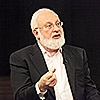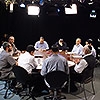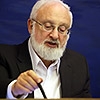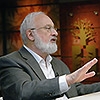Audio Version Of The Blog – 4/5/21
Listen to an Audio Version of the Blog
Download:MP3 Audio

Listen to an Audio Version of the Blog
Download:MP3 Audio

Spiritual progress happens through our mutual #inclusion in one another: the smaller the distance between us, the closer we are to the Creator. We will start to feel that this is the same distance. And then we will see that by separating us, the Pharaoh works for our own good.
From Twitter, 4/5/21
Related Material:
My Thoughts On Twitter 4/4/21
My Thoughts On Twitter 3/31/21
My Thoughts On Twitter 3/25/21
New Life 1302 – The Art Of Connection Between People
Dr. Michael Laitman in conversation with Oren Levi and Nitzah Mazoz
Communication should be based on the desire to complement, accept, and connect to each other rather than gain from others with the attitude of thieves. We should make room for one another within our own ego. This requires that the other person is more important to me than myself in the same way that our children are. If we try to make room inside for another person, we will discover that it is impossible and that we hit a wall. The wall only falls when we want to annul the distance between us and exist for the sake of the other’s soul. Connective communication is the art of filling others with what they need.
[279989]
From KabTV’s “New Life 1302 – The Art Of Connection Between People,” 3/21/21
 Question: Why must one first go to Egypt in order to get out of the egoistic state?
Question: Why must one first go to Egypt in order to get out of the egoistic state?
Answer: In order to realize who you are, that you are absolutely the opposite of the Creator, that you are not a human being but an animal controlled only by egoism. This is only possible if you are in a state called “Egypt.”
Question: Can we say that all of humanity is still in Egypt?
Answer: Yes. Absolutely all of humanity is in the state of Mitzraim (Egypt), when a person does not realize that he is controlled by egoism alone.
Mitzraim (Mitz Ra) in Hebrew means concentration of evil.
Question: So, in order to reveal love, one must understand hatred. It turns out that the Egyptian exile is a guarantee that a person will someday acquire altruistic properties in the future?
Answer: Yes. All this has already been planned and should only take on its material appearance.
[280234]
From KabTV’s ”Spiritual States” 3/26/21
Related Material:
Egoism Poisons Our Lives
Concentration Of Evil
Entering Egypt
 It seems that the Torah writes about adventures and great journeys: from ancient Babylon to the land of Canaan where Israel is today, from there to the Sinai desert, from the desert to Egypt and many years of living in it with all the events that took place there, and then fleeing from Egypt and crossing the Red Sea.
It seems that the Torah writes about adventures and great journeys: from ancient Babylon to the land of Canaan where Israel is today, from there to the Sinai desert, from the desert to Egypt and many years of living in it with all the events that took place there, and then fleeing from Egypt and crossing the Red Sea.
All this we should gradually separate from geographical places and historical events and place it inside a person as something that happens within him.
Each one should depict within oneself which qualities are called Egypt, the desert, Pharaoh, and Moses—all the details and characters of the story. This story should unfold inside a person and inside the relationships in the ten.
It is even harder to imagine this in the ten because it is closer to spirituality. We should build this process inside us in sensation so that everyone can feel how all the names the Torah mentions that refer to inanimate nature, plants, animals, and people as reflected in his feelings, thoughts, internal processes, and connections with others.
Gradually, a person begins to feel how the light of Passover works on him, that is, the light of transition from the corporeal state when he is in a group, studying but so far doing everything egotistically. He does not know what the intention for the sake of bestowal is because until he acquires a second nature, it is impossible to explain and depict it.
Just as the story of Passover describes the despair from the hard work for Pharaoh, so a person despairs to emerge from under the control of his egoism and to do something out of love for his neighbor. He does not find such forces, inclinations, and desires within himself.
Suddenly he feels that something is awakening in him, and he begins to understand that there really can be such a quality in a person called selfless bestowal.
It is because there is a special illumination that influences him and passes a new quality onto him. This is the change we need to yearn for. Of course, it does not come just out of a person’s effort but only due to the illumination from above. This is why all our work is a prayer, a request, that must be organized correctly in the ten regarding all the clarifications that we make when building our connection.
The entire process of the exodus from Egypt happens within the ten, within the ten Sefirot. Therefore, it becomes more and more obvious that everything is achieved through the force of the prayer, and we must direct all our efforts only to this: to pray together so that everyone feels his friend and is ready to help him.
Then we connect in our appeal to the upper force, we ask for the force of connection to help us find a mutual point between us so that everyone feels that they are coming out of themselves and becoming included in the common desire called the upper Malchut.
If each one is only inside himself, he is in the lower world. If he rises to the common desire, he already finds himself in the Malchut of the upper world. He thus enters the second phase of Passover, that is, the “transition,” taking a step toward the exodus from Egypt. He already wants not Pharaoh but the Creator to dominate over him so that the Creator rules within him. Therefore, he will have a special transition in order to change the upper authority from Pharaoh to the upper force.
One becomes more and more aware of how dependent and attached he is to his egoism, consciously or unconsciously constantly acting for one’s own benefit. Now he is beginning to think more and more about how he can act for the benefit of the Creator and for the benefit of the ten. This is already close to the exodus from Egypt and means that the lights of Passover are working on a person.
[280317]
From the Daily Kabbalah Lesson 3/31/21, “Pesach (Passover)”
Related Material:
Egoism Poisons Our Lives
Passover—The Holiday Of The Beginning Of Correction
On The Other Side Of The Final Sea
 If I cry out to the Creator alone, my cry will inevitably be egoistic and will remain unanswered. However, if I cry out from the group, then certainly the desires of others will be added there and to this extent the request will be heard. Therefore, there is no point in turning to the Creator alone because in this way a person does not build but destroys himself.
If I cry out to the Creator alone, my cry will inevitably be egoistic and will remain unanswered. However, if I cry out from the group, then certainly the desires of others will be added there and to this extent the request will be heard. Therefore, there is no point in turning to the Creator alone because in this way a person does not build but destroys himself.
It is obvious that we need to turn to the Creator together and ask Him to actualize our connection. From this connection, we can turn to Him with even greater strength and ask for force for mutual bestowal to each other, and from us to the Creator.
We exit Egypt, which is between us, we cross the Final Sea (Yam Suf) between us, we move through the desert between us, we receive the Torah, which will be between us. Thus, we advance until we all are connected in mutual bestowal, and in the light of this bestowal we begin to see a new world, not like our present one, but billions of times larger, infinitely vast.
In addition, it is eternal and perfect, a world where we feel and understand everything and never feel tired, we move forward without any difficulties and obstacles. All this depends only on the connection between us.
Passover, the exodus from Egypt, Pharaoh, Nachshon jumping into the sea—all this takes place inside the ten. Each state begins with separation between the friends and ends with a complete connection in the ten within which, to the extent of our unity, we reveal the upper force, the Creator.
When they speak about great events—about the parting of the Red Sea, life and death, about harsh wars—all this exists only inside the ten. There is nothing but one spiritual Partzuf of the ten Sefirot that goes through all these states.
[280266]
From the Daily Kabbalah Lesson 3/30/21, “Pesach (Passover)”
Related Material:
Not By Chance
The First Degree
Independent Of Good And Evil
 Question: The Pharaoh forces all those who strive to reveal the quality of bestowal or the Creator (called Israel) to build the cities of Pithom and Raamses. What are these two cities? What are they in reference to the inner work of a person?
Question: The Pharaoh forces all those who strive to reveal the quality of bestowal or the Creator (called Israel) to build the cities of Pithom and Raamses. What are these two cities? What are they in reference to the inner work of a person?
Answer: Building means filling the great desire called Pharaoh with egoism in both the right and left lines, in everything. But when we fill it, we see that this pleasure does not lead to any result except sheer disappointment.
Question: Your teacher gives this explanation: Raamses is Ra’am Sus, horse power, which symbolizes the work of man in order to fill his egoism. But then he suddenly feels himself at the edge of an abyss.
Pithom is Pi Tehom, mouth of the abyss. It turns out that you are left, as in Pushkin’s fairy tale, in a broken gutter?
Answer: Sure.
Question: There is also an explanation that these two cities are called Arei Miskenot, dangerous cities in Hebrew. Why are they dangerous?
Answer: Because of the fact that a person might never get out of his egoistic nature, rise above it, but will remain in these “cities,” getting deeper and deeper into them and dying.
Question: But won’t the evolutionary process oblige us to develop? Is there still a threat to stay in Egypt forever?
Answer: In general, there is essentially no such possibility because the Creator’s program is perfect and ultimately leads us to understand the need to leave Egypt. But, on the other hand, it is still a dangerous condition where a person can stay in it for a very long time, almost all his life.
However, he still feels a state of hopelessness. All the sensations described in the Torah are bound to appear in everyone. After all, in principle, many of us are already beginning to see that they just must escape from these states.
[280354]
From KabTV’s “Spiritual States” 3/26/21
Related Material:
Exile Is Separation From Brothers
Between The Creator And Pharaoh
Searching For The Brothers
 Question: Who are “Egyptians” and “Israelites” in spiritual work?
Question: Who are “Egyptians” and “Israelites” in spiritual work?
Answer: The Torah speaks of man as an object that includes the whole world. Everything is inside a person.
The Egyptians in us are egoistic forces; the Israelites are altruistic forces or forces that want to be altruistic but are ruled by the Egyptians (egoism).
Pharaoh personifies the complete egoism in which we find ourselves.
The Creator is the upper force that governs Pharaoh, Moses, and everyone else. His task is to bring all creation to be like Him, to altruism. But this requires awareness of egoism being evil and the way out of it.
Moses is a force that is a part of the Creator, which is inside man and pulls him forward toward the disclosure and understanding of the highest spiritual properties.
Interactions occur between these forces when a person feels which of his desires are egoistic, which are altruistic, which of them seek connection with the Creator, and which of them cling to the Pharaoh.
Thus, he sorts them out, and as a result of his work, he understands which voice speaks to him, he realizes that he is completely under the rule of the Pharaoh. Wherever he turns, the Pharaoh is lurking in him.
It seems to him that he is already working for the sake of bestowal and love of neighbors, that he is above all earthly egoistic desires, but he still continues to constantly reveal them inside. In the end, he does not just despair but becomes convinced that the Pharaoh owns everything, one hundred percent.
But at the same time, a special point, called Moses, stands out in him and it opposes Pharaoh. It enters into a fight with him and dooms itself to the ten Egyptian plagues, which our egoism must go through. So, man begins to understand that he can get rid of the ego. But how? It is not clear yet.
With this sensation, he enters a dark night where, on one hand, it is not obvious and not clear how the deliverance will take place, but on the other hand, he passionately desires it. This night is called the night of the exodus from Egypt, which we celebrate on Passover.
[181815]
From KabTV’s “News with Dr. Michael Laitman” 4/13/16
Related Material:
The Night Of The Exodus From Egypt
Pharaoh
Questions About Pesach
 Question: It is interesting that a person does not immediately become a slave in Egypt. According to the Tanakh, Pharaoh, through Joseph, invited the sons of Jacob and gave them the land of Goshen.
Question: It is interesting that a person does not immediately become a slave in Egypt. According to the Tanakh, Pharaoh, through Joseph, invited the sons of Jacob and gave them the land of Goshen.
What does it mean that a person does not immediately feel Egypt as slavery in the spiritual work?
Answer: Naturally. There is even a semi-anecdote that once people marched with slogans “Long live the slave-owning society” because it was progressive in comparison to the previous one.
After the slave-owning formation, other ones appeared, and each time people rushed to fulfill their growing egoism more and more.
Thus, it turns out that they constantly find themselves in a new social environment, which they themselves create.
[280304]
From KabTV’s “Spiritual States” 3/26/21
Related Material:
Do Not Stay In Egypt Forever
On The Other Side Of The Final Sea
Escape From Egyptian Darkness
 Michael Laitman, On Quora: “Do you think crossing the Red Sea by Moses really happened?“
Michael Laitman, On Quora: “Do you think crossing the Red Sea by Moses really happened?“
According to the wisdom of Kabbalah, the crossing of the Red Sea describes an inner spiritual state of leaving one’s egoistic desires behind, and entering into spiritual desires for love, bestowal and connection. It is essentially the crossing from this world to the spiritual world, and it is a process that unfolds in any person who applies themselves to the method of spiritual ascent.
When we exit the egoistic boundaries of this world, i.e., the desire to enjoy for self-benefit alone, we have to leave it once and for all. The boundary we cross in such a transition is described as “crossing the Red Sea.”
The process of exiting the ego requires powerful egoistic resistance, which is expressed as a desire to return to Egypt (i.e., living under the control of our self-aimed demands) in order to be slaves of the ego as before. The nation, which are desires that want to exit Egypt, still have no idea how to progress in order to become more altruistic, giving and loving.
These states play out inside each and every person and in a group of people as they try to rise above their ego in order to connect with each other. The parting of the Red Sea takes place by a process that kabbalists call “faith above reason,” symbolized by Moses’ rod. In general, “faith above reason” means the elevation of the importance of progressing on the spiritual path—a path of love, bestowal and positive connection—over the importance of remaining servants to our egoistic and materialistic desires. By default, the importance of spirituality is lower than the importance we naturally hold for egoistic pursuits, and thus raising the importance of spirituality requires a supportive environment of like-minded people aiming for spiritual attainment.
The Red Sea parts for those in the state of faith above reason. Crossing the Red Sea means that we shift from the corporeal transient world that is under the control of egoistic desires, into the eternal spiritual world that runs by an opposite altruistic operating system. Pharaoh’s armies represent the inner state called “below reason.” Their drowning represents the ego that is left behind as we shift into spirituality.
This action is symbolized by Nachshon’s jump into the sea. Why does Nachshon jump into the sea first instead of Moses? It is because Moses is already beyond that state, in the quality of Bina. In other words, the spiritual qualities of love, bestowal and connection already govern Moses. His connection to these spiritual qualities leads the nation, i.e., desires aimed at exiting the ego and entering into a spiritual connection, gradually releasing them from the ego, and leading them to spiritual connection.
The desires that have no desire to advance by way of faith above reason, but which want to remain in the ego, are put to death by the condition of faith above reason. This means that they cannot cross the Red Sea into spiritual attainment, as they cannot obtain the quality of love and bestowal above their ego. The egoistic desires die at sea, causing a split between egoistic and altruistic desires.
The sea, or water in general, represents life—the quality of Bina, bestowal and love. We are born in water. Water is life’s foundation, but there are good and bad waters. When the water is still within the ego’s bounds, it is harmful, drowning those who are in it.
The entire story about crossing the Red Sea describes the acquisition of a supernatural ability, the quality of caring about others with no self-interest, and the shift to a completely different system of existence in which benefiting others becomes more important than self-benefit. We cross a boundary, and where we previously lived only for ourselves through the ordinary ego, we shift into a life of love for, and bestowal unto, others.
Crossing the Red Sea thus describes a complete inversion of our attitude to life— from egoism to altruism, corporeality to spirituality, division to connection, and reception to bestowal—and it is driven solely by the aspiration to become as loving and giving as the Creator: a force of pure bestowal with no shred of self-interest.
Based on the program “Spiritual States” with Kabbalist Dr. Michael Laitman and Michael Sanilevich on Friday, April 1, 2021. Written/edited by students of Kabbalist Dr. Michael Laitman.